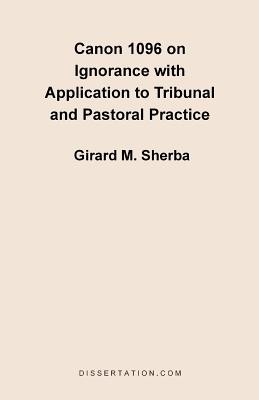
- We will send in 10–14 business days.
- Author: Girard M Sherba
- Publisher: Dissertation.Com. - Do Not Use
- ISBN-10: 1581121342
- ISBN-13: 9781581121346
- Format: 14.9 x 21.6 x 1.3 cm, minkšti viršeliai
- Language: English
- SAVE -10% with code: EXTRA
Canon 1096 on Ignorance with Application to Tribunal and Pastoral Practice (e-book) (used book) | bookbook.eu
Reviews
Description
Before Vatican II, marriage was often considered, or at least popularly expressed, as a union of bodies; that is to say, marriage was an exclusive contract by which a man and a woman mutually handed over their bodies for the purpose of acts which led to the procreation of children. Matrimonial jurisprudence was primarily focused on this marital contract. With the advent of Vatican II and its emphasis on the personalist notion of marriage, a new age dawned whereby canonists, especially auditors of the Roman Rota, were henceforth to view marriage as a union of persons. "Person" is more than a "body"; rather, a person is an individual consisting of wants, needs, desires, impulses, hopes and dreams, whose life experience has been shaped by the milieu "cultural, familial, religious" from which he or she comes. "Union" is not only simply understood as a "contract", but also is now once again recognized as a "covenant", a concept which, at least in the Latin Church, was prevalent until the 12th century.
EXTRA 10 % discount with code: EXTRA
The promotion ends in 21d.10:55:55
The discount code is valid when purchasing from 10 €. Discounts do not stack.
- Author: Girard M Sherba
- Publisher: Dissertation.Com. - Do Not Use
- ISBN-10: 1581121342
- ISBN-13: 9781581121346
- Format: 14.9 x 21.6 x 1.3 cm, minkšti viršeliai
- Language: English English
Before Vatican II, marriage was often considered, or at least popularly expressed, as a union of bodies; that is to say, marriage was an exclusive contract by which a man and a woman mutually handed over their bodies for the purpose of acts which led to the procreation of children. Matrimonial jurisprudence was primarily focused on this marital contract. With the advent of Vatican II and its emphasis on the personalist notion of marriage, a new age dawned whereby canonists, especially auditors of the Roman Rota, were henceforth to view marriage as a union of persons. "Person" is more than a "body"; rather, a person is an individual consisting of wants, needs, desires, impulses, hopes and dreams, whose life experience has been shaped by the milieu "cultural, familial, religious" from which he or she comes. "Union" is not only simply understood as a "contract", but also is now once again recognized as a "covenant", a concept which, at least in the Latin Church, was prevalent until the 12th century.


Reviews